Shell Plc Bundle
Who Really Calls the Shots at Shell Plc?
Unraveling the ownership of Shell Plc, a titan in the energy sector, is key to understanding its future. Knowing who owns Shell illuminates the company's strategic direction, investment priorities, and its response to the global energy transition. Shell Plc SWOT Analysis can provide further insights into the company's strengths and weaknesses.
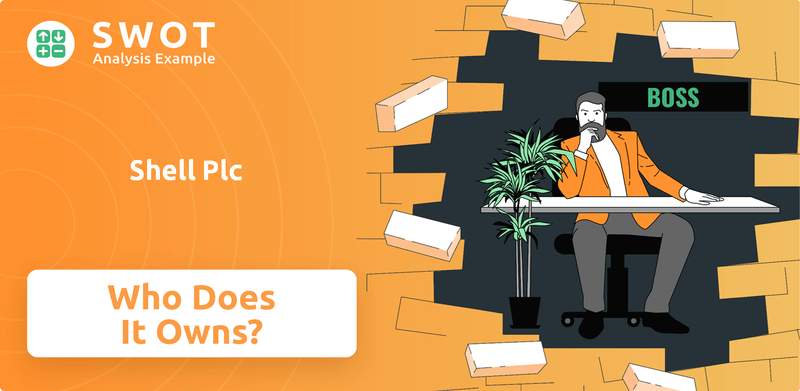
From its roots as Royal Dutch Shell, understanding the Shell parent company and its evolution provides crucial context. This exploration will detail the Shell shareholders, including major investors and the influence of public ownership, to reveal the forces shaping this energy giant. Learn about the Shell Plc ownership history and how it impacts decisions, from the board of directors to the company's subsidiaries.
Who Founded Shell Plc?
The foundation of Shell plc lies in the merger of two significant entities: Royal Dutch Petroleum Company and The 'Shell' Transport and Trading Company Ltd. This union, finalized in 1907, was a strategic move to compete with the dominant oil companies of the era. The merger brought together the strengths of both companies, creating a formidable player in the global oil industry.
Royal Dutch Petroleum, established in 1890, was spearheaded by August Kessler, Henri Deterding, and Hugo Loudon. Their focus was on developing oil fields in Sumatra. Simultaneously, The 'Shell' Transport and Trading Company, founded in 1897 by Marcus Samuel and his brother Samuel Samuel, transitioned from trading oriental seashells to oil transportation and trading. This dual origin shaped the early ownership structure of Shell.
The merger agreement stipulated a 60:40 ownership split, with Royal Dutch Petroleum holding 60% and 'Shell' Transport and Trading Company holding 40%. This division reflected the relative sizes and assets of the merging companies, establishing a foundational ownership structure that would influence the company's trajectory for years to come. The early ownership was a combination of the original shareholders from these two companies, representing a mix of Dutch and British interests.
The early ownership of Shell was a blend of shareholders from Royal Dutch Petroleum and The 'Shell' Transport and Trading Company. The merger was driven by the need to compete with Standard Oil. The initial ownership structure of the combined entity was a 60:40 split, with Royal Dutch Petroleum holding the majority stake.
- The Royal Dutch Petroleum Company was founded in 1890.
- The 'Shell' Transport and Trading Company was founded in 1897.
- The merger occurred in 1907.
- Early ownership was a mix of Dutch and British interests.
Shell Plc SWOT Analysis
- Complete SWOT Breakdown
- Fully Customizable
- Editable in Excel & Word
- Professional Formatting
- Investor-Ready Format
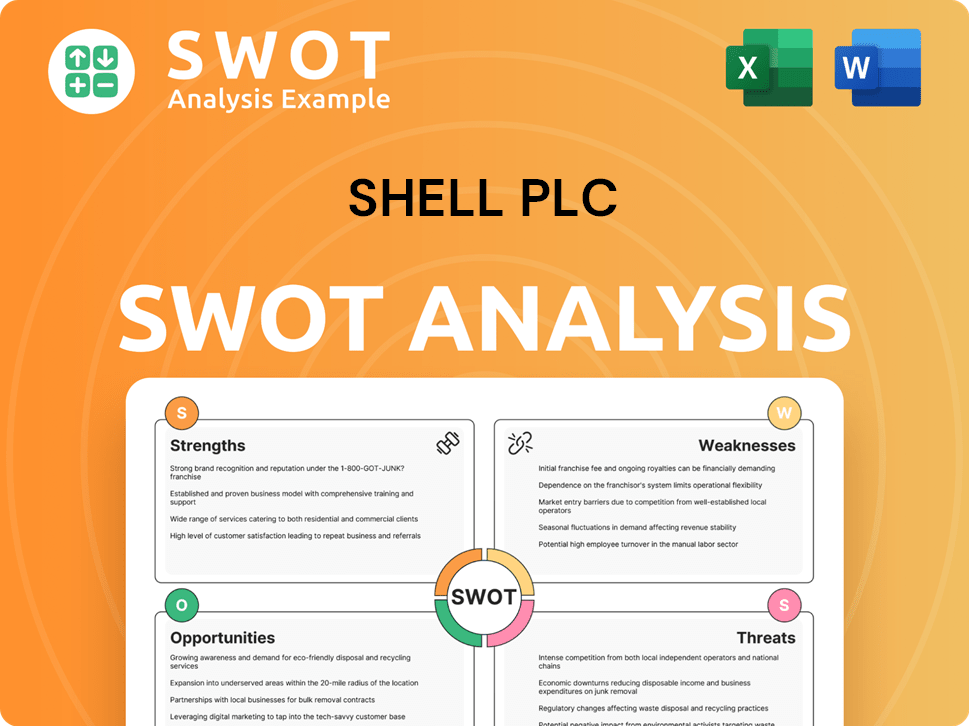
How Has Shell Plc’s Ownership Changed Over Time?
The ownership structure of Shell plc has evolved significantly since its formation in 1907. A key transformation occurred in January 2022, when it transitioned from a dual-listed company, Royal Dutch Shell plc, to a single entity, Shell plc. This unification streamlined its share structure, replacing the A/B share system with a single class of ordinary shares and relocating its tax residence to the UK. The change aimed to simplify capital allocation, enhance dividend distributions, and streamline share buyback programs, directly impacting shareholder value and governance.
As a publicly traded entity, Shell's ownership is primarily held by institutional investors. The shift to a single share class was a strategic move to improve shareholder returns and optimize corporate structure. Shell's share buyback programs, such as the $3.5 billion program completed in February 2025 and an additional $3.5 billion program announced for the first quarter of 2025, directly influence its ownership structure by reducing the number of outstanding shares and increasing the proportional stake of remaining shareholders.
| Event | Date | Impact on Ownership |
|---|---|---|
| Formation of Royal Dutch Shell | 1907 | Initial establishment of the company, setting the stage for future ownership structures. |
| Transition to a Single Entity (Shell plc) | January 2022 | Simplified share structure, single class of ordinary shares, and relocation of tax residence to the UK. |
| Share Buyback Programs | Ongoing (e.g., $3.5 billion in February 2025, $3.5 billion in Q1 2025) | Reduced outstanding shares, increasing the proportional stake of remaining shareholders. |
The major institutional shareholders of Shell include Vanguard Group, BlackRock, and State Street Corporation. As of December 31, 2024, Vanguard Group held approximately 8.21% of Shell's shares, while BlackRock held around 7.05%. These figures are subject to change based on market activity. Individual insider ownership is typically a small percentage. For more insights, consider exploring the Growth Strategy of Shell Plc.
Shell's ownership is largely institutional, with Vanguard and BlackRock as major shareholders.
- The move to a single share class in 2022 simplified the structure.
- Share buyback programs directly impact the ownership stakes of existing shareholders.
- The company's structure aims to boost shareholder returns.
- Understanding the evolution of Shell Plc Ownership is crucial for investors.
Shell Plc PESTLE Analysis
- Covers All 6 PESTLE Categories
- No Research Needed – Save Hours of Work
- Built by Experts, Trusted by Consultants
- Instant Download, Ready to Use
- 100% Editable, Fully Customizable
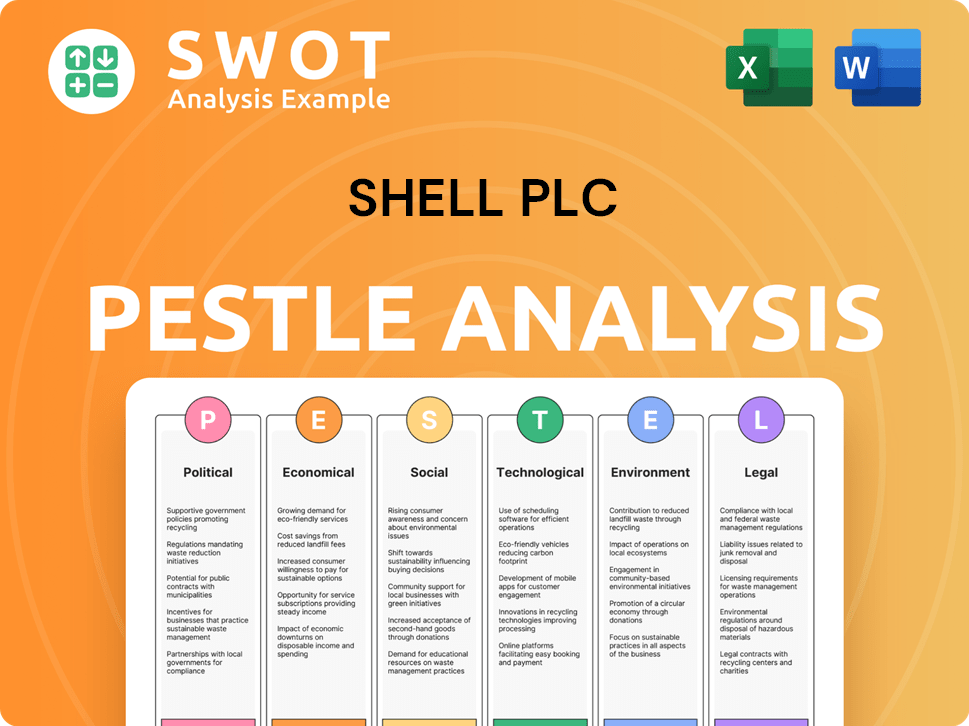
Who Sits on Shell Plc’s Board?
The Board of Directors of Shell plc oversees the company's governance and strategic direction, acting on behalf of its shareholders. As of early 2025, the Board includes both executive and non-executive directors. The structure ensures a balance of perspectives and expertise in guiding the company's operations. The non-executive directors are expected to provide independent oversight and challenge management decisions in the best interest of all shareholders.
Key figures on the Board include Wael Sawan as the Chief Executive Officer and Sinead Gorman as the Chief Financial Officer, both executive directors. Non-executive directors, such as Andrew Mackenzie, bring extensive industry experience. The Board also comprises independent non-executive directors with expertise in finance, sustainability, and international business. This diverse composition supports informed decision-making across various aspects of the business. The Competitors Landscape of Shell Plc provides insights into the competitive environment in which Shell operates, further highlighting the importance of effective board leadership.
| Board Member | Role | Notes |
|---|---|---|
| Wael Sawan | Chief Executive Officer | Executive Director |
| Sinead Gorman | Chief Financial Officer | Executive Director |
| Andrew Mackenzie | Non-Executive Director | Significant industry experience |
The voting structure for Shell plc follows a one-share-one-vote principle for its ordinary shares, established after the unification of its share structure in January 2022. This approach ensures that each share has equal voting power, promoting a fair distribution of control among shareholders. While specific board members directly representing major institutional shareholders like Vanguard or BlackRock are not typically appointed, the non-executive directors are expected to provide independent oversight and challenge management decisions in the best interest of all shareholders.
Shareholder engagement significantly influences Shell's strategic direction, particularly concerning its energy transition and carbon emissions. Activist investor campaigns pressure the company to accelerate decarbonization efforts and enhance transparency. Institutional investors with ESG mandates drive these campaigns, impacting decision-making.
- Ongoing discussions on carbon emissions targets and renewable energy investments.
- Activist campaigns push for quicker decarbonization.
- Increased transparency and reporting requirements.
- Influence of ESG mandates on strategic decisions.
Shell Plc Business Model Canvas
- Complete 9-Block Business Model Canvas
- Effortlessly Communicate Your Business Strategy
- Investor-Ready BMC Format
- 100% Editable and Customizable
- Clear and Structured Layout
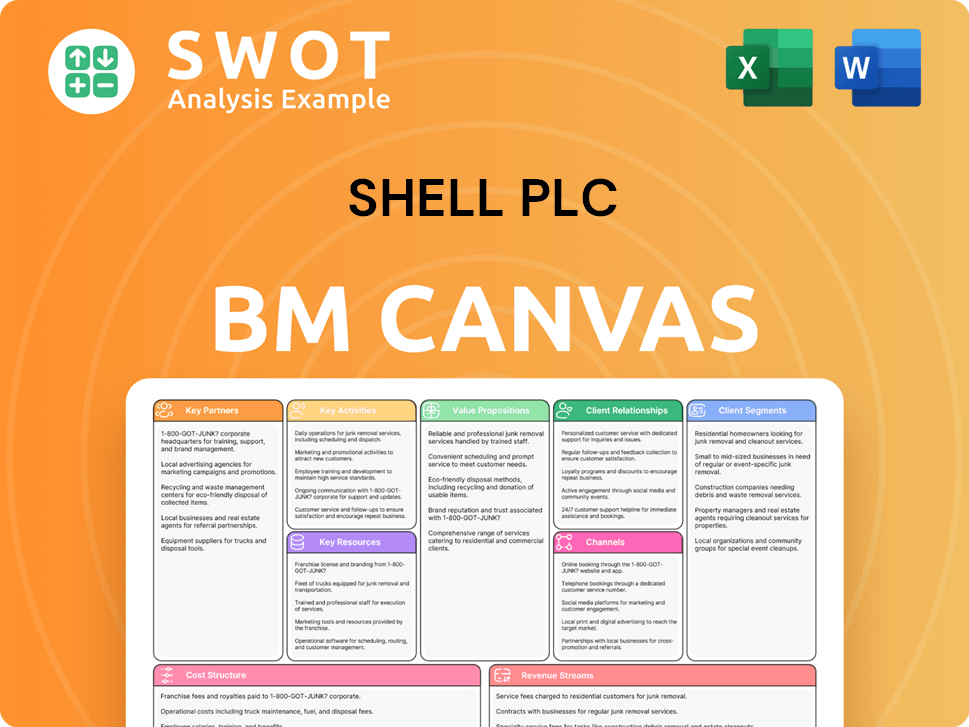
What Recent Changes Have Shaped Shell Plc’s Ownership Landscape?
Over the past few years, Shell plc has undergone significant shifts in its ownership landscape. A key move was the simplification of its share structure and relocation of its tax residence to the UK in January 2022. This was designed to enhance the company's agility and appeal to investors. Following this, Shell has actively pursued share buyback programs. For example, in early 2025, Shell completed a $3.5 billion share buyback program in February 2025, with another $3.5 billion program announced for the first quarter of 2025. These buybacks increase the ownership stake of existing shareholders.
Industry trends show an increasing focus on institutional ownership, particularly from funds with Environmental, Social, and Governance (ESG) mandates. Activist investors are also playing a role, pushing for accelerated energy transition and greater shareholder returns. Shell has faced pressure from activist shareholders regarding carbon emission reduction targets, influencing the company's strategic direction. The ongoing divestments of non-core assets, such as the sale of its Nigerian onshore oil and gas joint venture interest announced in January 2024, also impact its ownership profile. These actions are part of a broader strategy to optimize its portfolio and potentially lead to further capital returns to shareholders or investments in new growth areas, especially in renewables and low-carbon solutions. To understand more about the company's origins, you can read a Brief History of Shell Plc.
Shell's strategic focus on disciplined capital allocation, shareholder distributions, and investments in its energy transition will continue to shape its ownership structure and investor base. This includes decisions on who owns Shell and how the company is structured. Shell's commitment to share buybacks and strategic divestments highlights its approach to shareholder value and its adaptation to the evolving energy market. These actions are key in understanding who owns Shell and the company's future direction.
Shell has been actively involved in share buyback programs. In early 2025, Shell completed a $3.5 billion share buyback program. Another $3.5 billion program was announced for the first quarter of 2025.
There's an increasing focus on institutional ownership, particularly from funds with Environmental, Social, and Governance (ESG) mandates. This indicates a shift in investor preferences and priorities.
Activist investors are pushing for accelerated energy transition and greater shareholder returns. Shell has faced pressure from activist shareholders regarding its carbon emission reduction targets.
Shell is divesting non-core assets to optimize its portfolio. The sale of its Nigerian onshore oil and gas joint venture interest is an example of this strategy. These actions impact the Shell Company Owners.
Shell Plc Porter's Five Forces Analysis
- Covers All 5 Competitive Forces in Detail
- Structured for Consultants, Students, and Founders
- 100% Editable in Microsoft Word & Excel
- Instant Digital Download – Use Immediately
- Compatible with Mac & PC – Fully Unlocked
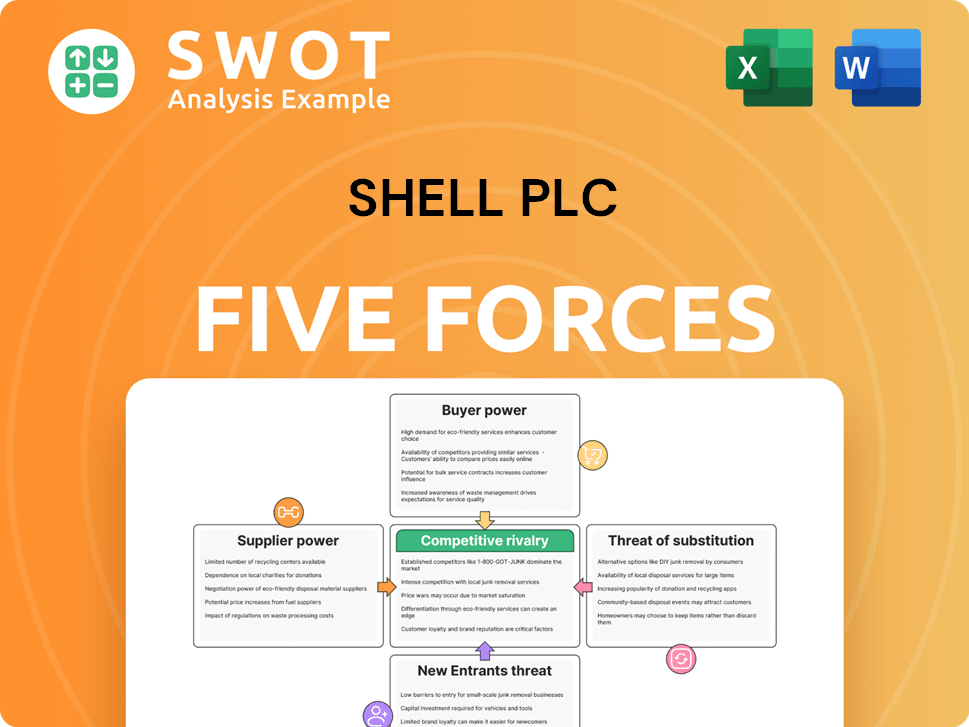
Related Blogs
- What are Mission Vision & Core Values of Shell Plc Company?
- What is Competitive Landscape of Shell Plc Company?
- What is Growth Strategy and Future Prospects of Shell Plc Company?
- How Does Shell Plc Company Work?
- What is Sales and Marketing Strategy of Shell Plc Company?
- What is Brief History of Shell Plc Company?
- What is Customer Demographics and Target Market of Shell Plc Company?
Disclaimer
All information, articles, and product details provided on this website are for general informational and educational purposes only. We do not claim any ownership over, nor do we intend to infringe upon, any trademarks, copyrights, logos, brand names, or other intellectual property mentioned or depicted on this site. Such intellectual property remains the property of its respective owners, and any references here are made solely for identification or informational purposes, without implying any affiliation, endorsement, or partnership.
We make no representations or warranties, express or implied, regarding the accuracy, completeness, or suitability of any content or products presented. Nothing on this website should be construed as legal, tax, investment, financial, medical, or other professional advice. In addition, no part of this site—including articles or product references—constitutes a solicitation, recommendation, endorsement, advertisement, or offer to buy or sell any securities, franchises, or other financial instruments, particularly in jurisdictions where such activity would be unlawful.
All content is of a general nature and may not address the specific circumstances of any individual or entity. It is not a substitute for professional advice or services. Any actions you take based on the information provided here are strictly at your own risk. You accept full responsibility for any decisions or outcomes arising from your use of this website and agree to release us from any liability in connection with your use of, or reliance upon, the content or products found herein.